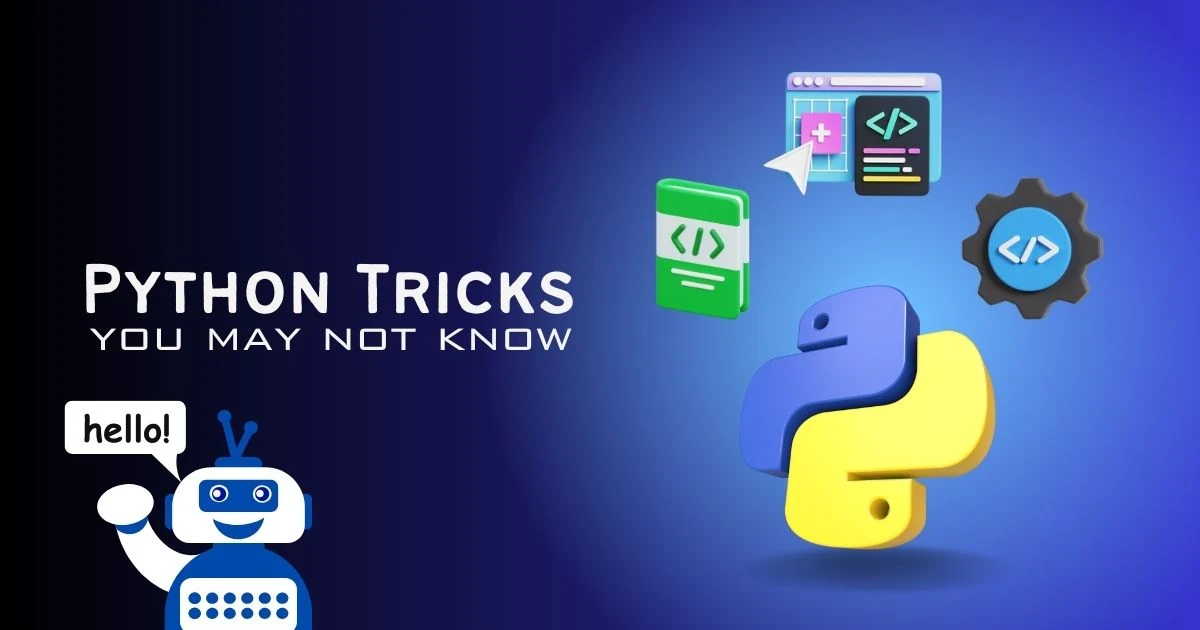
In programming world, Python has firmly established itself as a versatile and powerful language. Whether you're a seasoned developer or a tech enthusiast, there's always something new to discover in the vast landscape of Python. In this blog post, we'll delve into the lesser-known Python tricks that can elevate your coding game, making you more efficient and proficient. Brace yourself for a journey through the uncharted territories of Python wizardry!
1. Unpacking Magic with Extended Unpacking
Let's kick things off with a nifty trick known as extended unpacking. Most Pythonistas are familiar with the standard unpacking syntax using the asterisk (*), but did you know you can use multiple asterisks in Python 3 to achieve extended unpacking? Learn how to apply this powerful feature to simplify your code and enhance readability.
2. Context Managers for Resource Management
Context managers are often underutilized gems in Python. Explore the elegance of the "with" statement and discover how it can streamline resource management tasks, ensuring your code is not only cleaner but also more robust.
3. The Power of Enumerate
Do you find yourself using the range() function along with len() when iterating through sequences? Enter the enumerate function! Unearth the simplicity and efficiency it brings to your loops, making your code more Pythonic and expressive.
4. List Comprehensions Unleashed
List comprehensions are not just a concise way to create lists; they are a powerful tool for filtering and transforming data. Dive into advanced list comprehension techniques that can significantly improve the efficiency of your code while keeping it elegant.
5. Mastering Multiple Assignments
Python's ability to perform multiple assignments in a single line is often overlooked. Discover the beauty of simultaneous variable assignments, tuple unpacking, and the global statement. Learn how these techniques can enhance code readability and reduce the number of lines in your scripts.
6. Lambda Functions and the Map-Filter Combo
Lambda functions might seem like a basic concept, but their true potential shines when combined with the map() and filter() functions. Explore how lambda functions can simplify your code and make it more expressive, especially when dealing with iterable transformations and filtering.
7. Decorators: Beyond the Basics
Decorators are not just for adding a layer of functionality to functions. Uncover the depths of decorators by exploring advanced use cases, such as parameterized decorators, class decorators, and even stacking decorators for a modular and clean code structure.
8. Unveiling the Magic of Metaclasses
Metaclasses might sound like an arcane concept, but understanding them can unlock new levels of control over class creation and behavior. Delve into the world of metaclasses, exploring their applications and when they can be a valuable addition to your toolkit.
9. The Beauty of Generators
Generators are often overlooked, but their lazy evaluation and memory efficiency make them powerful tools. Learn how to implement generators and comprehend scenarios where they outshine traditional iterable structures, making your code more efficient.
10. The Zen of Python: Embrace It
Guido van Rossum's Zen of Python provides guiding principles for writing computer programs in Python. Explore each principle in detail and understand how adhering to these guidelines can result in more readable, maintainable, and Pythonic code.
11. Mastering Regular Expressions
Regular expressions (regex) can be daunting, but mastering them opens up a world of text manipulation possibilities. Delve into the syntax, metacharacters, and advanced techniques to become proficient in crafting regex patterns that solve complex problems with ease.
12. Efficient File Handling
File handling is a common task in programming, but there are tricks to make it more efficient. Explore context managers, the pathlib module, and advanced file manipulation techniques to streamline your file-related operations and ensure your code is robust.
13. Understanding Global and Local Scopes
Python's scoping rules can sometimes be tricky to navigate. Gain a deeper understanding of global and local scopes, the LEGB rule, and discover techniques to work with variables in nested functions without causing unintended side effects.
14. Harnessing the Power of itertools
The itertools module provides a treasure trove of tools for working with iterators and iterables. Explore advanced itertools functions such as permutations, combinations, and infinite iterators to solve complex problems with elegance and efficiency.
15. Embracing Type Annotations
Python 3.5 introduced type annotations, bringing a semblance of static typing to the language. Understand the benefits of type annotations, explore type hints, and discover tools like Mypy to enforce type checking in your codebase without sacrificing Python's dynamic nature.
16. Diving into the CPython Internals
For those who crave a deeper understanding of Python, exploring CPython internals can be enlightening. Peek behind the curtains to comprehend the inner workings of the Python interpreter, the Global Interpreter Lock (GIL), and explore techniques for optimizing performance.
17. Exploiting the Power of F-Strings
Formatted string literals, or f-strings, were introduced in Python 3.6, providing a concise and readable way to embed expressions inside string literals. Dive into the world of f-strings, learn advanced formatting options, and witness how they outshine traditional string formatting methods.
18. Leveraging the power of asyncio
Asynchronous programming with asyncio is a game-changer for handling concurrent tasks. Uncover the basics of asynchronous programming in Python, delve into the asyncio module, and explore how it can enhance the performance of I/O-bound operations in your applications.
19. The Art of Exception Handling
Exception handling is a crucial aspect of writing robust and error-tolerant code. Learn advanced techniques for exception handling, including custom exceptions, the "finally" block, and context managers, to ensure your applications gracefully handle unexpected situations.
20. Pythonic Code Reviews and Best Practices
The journey concludes with a focus on Pythonic code reviews and best practices. Explore guidelines for writing clean, maintainable, and idiomatic Python code. Understand the importance of docstrings, meaningful variable names, and adherence to PEP 8 for fostering a collaborative and efficient development environment.
Conclusion
Congratulations, intrepid Python explorer! You've traversed the uncharted realms of Python and unlocked the secrets of its hidden gems. From advanced list comprehensions to the intricacies of metaclasses, these tricks are sure to elevate your Python prowess. As you continue your coding journey, remember that Python's beauty lies not just in its simplicity but in the myriad possibilities it offers to those who dare to explore. Happy coding!





0 Comments